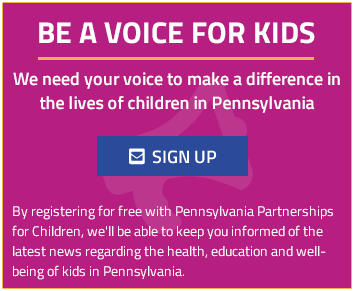The system leaves foster care youth behind. A West Virginia nonprofit wants to change that.
Statewide data from Pennsylvania Partnerships for Children paints a clear yet troubling picture. Among young adults with foster care experience in 2021, nearly a quarter did not have stable housing, almost half did not have part-time or full-time employment and only 25% had post-secondary enrollment. Independent living services, such as vocational training, tuition aid and housing vouchers, […]
PA Early Intervention programs vital for child development
A new study highlights the importance of Pennsylvania’s Early Intervention program and its services for infants and toddlers at risk of developmental delays. Kari King, president and CEO of Pennsylvania Partnerships for Children, said there are two Early Intervention programs: “Part B” for preschoolers, ages 3 to 5, and her group advocates for “Part C,” which supports […]












PAP4Children Follow 9,833 2,614
Pennsylvania Partnerships for Children is dedicated to improving the well-being of PA's 2.6 million kids. We're independent, non-partisan and non-profit.
Equality matters! By providing every family with equal opportunity and access to the supports they need, we can improve the safety and well-being of children and youth nationwide. #ChildAbusePreventionMonth #ThrivingFamilies https://ow.ly/vk6i50RqYrS
Join us this Sunday for Pennsylvania Newsmakers! Our President and CEO joins host Terry Madonna to discuss Early Intervention and Pre-K in the state. Tune in to WGAL Sunday at 11:30 AM or watch now: https://ow.ly/70bu50RpilT
We know what we'll be watching on Sunday! 📺Catch our President and CEO, Kari King, on @PANewsmakers this Sunday at 11:30 AM on @WGAL.
🚨New Fact Sheet Alert: Prioritizing Transition Age Youth for Future Success. This new fact sheet outlines commonsense policy solutions that ensure youth have the best opportunity for success as they transition to adulthood. https://ow.ly/rjxk50Roax5